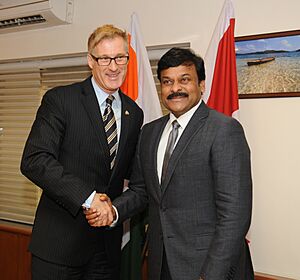Maxime Bernier facts for kids
Quick facts for kids
Maxime Bernier
|
|
|---|---|
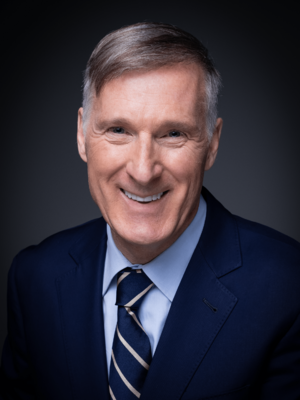
Bernier in 2023
|
|
| Leader of the People's Party | |
| Assumed office September 14, 2018 |
|
| Preceded by | Office established |
| Minister of State (Small Business and Tourism, and Agriculture) | |
| In office May 18, 2011 – November 4, 2015 |
|
| Prime Minister | Stephen Harper |
| Preceded by | Rob Moore |
| Succeeded by | Bardish Chagger |
| Chair of the National Defence Select Committee | |
| In office March 9, 2009 – June 20, 2011 |
|
| Preceded by | Rick Casson |
| Succeeded by | James Bezan |
| Minister of Foreign Affairs | |
| In office August 13, 2007 – May 26, 2008 |
|
| Prime Minister | Stephen Harper |
| Preceded by | Peter MacKay |
| Succeeded by | David Emerson |
| Minister of Industry Registrar General of Canada |
|
| In office February 6, 2006 – August 13, 2007 |
|
| Prime Minister | Stephen Harper |
| Preceded by | David Emerson |
| Succeeded by | Jim Prentice |
| Member of Parliament for Beauce |
|
| In office January 23, 2006 – October 21, 2019 |
|
| Preceded by | Claude Drouin |
| Succeeded by | Richard Lehoux |
| Personal details | |
| Born | January 18, 1963 Saint-Georges, Quebec, Canada |
| Political party | People's (since 2018) |
| Other political affiliations |
Conservative (until 2018) |
| Spouses |
Caroline Chauvin
(m. 1991; div. 2005)Catherine Letarte
(m. 2019) |
| Children | 2 |
| Parents | Gilles Bernier (father) Doris Rodrigue (mother) |
| Residences | Saint-Georges, Quebec, Canada |
| Education | Université du Québec à Montréal (BCom) University of Ottawa (LLB) |
| Profession | Author, businessman, consultant, lawyer |
Maxime Bernier (born January 18, 1963) is a Canadian politician. He is the founder and leader of the People's Party of Canada (PPC). Before starting his own party, he was a member of the Conservative Party.
Bernier was a Member of Parliament (MP) for the riding of Beauce from 2006 to 2019. During this time, he served as a powerful government official, called a Cabinet minister, under Prime Minister Stephen Harper.
Before politics, Bernier worked in law and business. In 2018, he left the Conservative Party because he disagreed with its leader. He then started the PPC. He lost his seat in Parliament in the 2019 election.
Bernier has strong views on many topics. He supports lower taxes and less government spending. He also has ideas about changing Canada's laws on immigration and multiculturalism. During the COVID-19 pandemic, he protested against public health rules and was arrested for breaking them at a gathering.
Contents
Early Life and Education
Maxime Bernier was born in Saint-Georges, Quebec. His father, Gilles Bernier, was also a politician who represented the same area, Beauce, from 1984 to 1997. Bernier has said that his father was a role model, but he wanted to have his own political style.
As a teenager, Bernier played football. His team even won a major championship at the Olympic Stadium in 1980.
For his education, Bernier earned a degree in business from the Université du Québec à Montréal. He then studied law at the University of Ottawa. After graduating, he became a lawyer in 1990.
Career Before Politics
Before entering politics, Bernier had a successful career for 19 years. He worked as a lawyer and in the banking industry. He also worked for the government of Quebec as an advisor on money matters.
Later, he became the Executive Vice-President of the Montreal Economic Institute. This is a group that studies and promotes free-market ideas, which means less government control over business. He even wrote a book about changing the tax system.
Political Career
In 2005, Bernier decided to run for office. He became the Conservative candidate for the Beauce area in the 2006 federal election. He won easily with 67% of the vote. This was a very large victory for a Conservative politician in Quebec.
Working in Government (2006–2015)
Minister of Industry
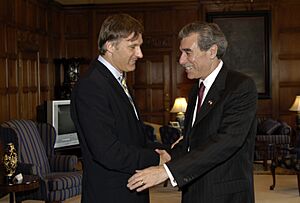
Because he was a new and popular MP from Quebec, Prime Minister Stephen Harper appointed Bernier as the Minister of Industry in 2006. In this role, he was in charge of rules for businesses in Canada.
Bernier worked to change the rules for telephone companies to increase competition. Some experts praised his work, with one professor calling him "the best Industry Minister in 30 years."
Minister of Foreign Affairs
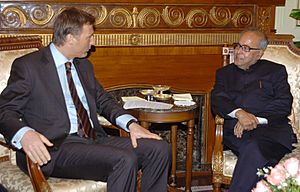
In 2007, Bernier was promoted to Minister of Foreign Affairs. This job involved representing Canada to other countries.
However, his time in this role was short. In 2008, he had to resign after he accidentally left secret government papers at the home of his girlfriend. The Prime Minister said it was a "very serious error." This event made Bernier rethink his political career.
Return to a Smaller Role
After being re-elected in 2008, Bernier spent a few years as a regular MP, not a minister. In 2011, he was given a junior minister job as the Minister of State for Small Business and Tourism.
He later said he took the job to help the government reduce its spending and to rebuild his career. He was also put in charge of a project to cut down on unnecessary government rules for businesses.
Conservative Leadership Campaign (2016–2017)
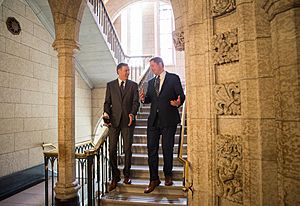
In 2016, Bernier decided to run for the leadership of the Conservative Party. His campaign was based on four main ideas: freedom, responsibility, fairness, and respect.
He proposed many changes, such as lowering taxes, ending government support for some large companies, and getting rid of a system called supply management, which controls the price of milk, eggs, and chicken.
His ideas were popular with many people. In the final vote in 2017, he came in a very close second place to Andrew Scheer. Bernier received 49.05% of the votes, while Scheer won with 50.95%.
Leaving the Conservative Party
After the leadership race, Bernier became a critic for the party. However, he continued to disagree with the party's leader, Andrew Scheer.
In 2018, Bernier planned to release a book about his political ideas. One chapter criticized how some groups in Quebec had opposed his plan to end supply management. To keep the party united, he agreed to delay the book's release. But when the chapter was posted online, Scheer removed Bernier from his senior role.
A few months later, Bernier made several posts on Twitter criticizing the government's focus on "diversity." He said Canada should focus more on what unites people. These comments caused a lot of debate.
Founding the People's Party of Canada
On August 23, 2018, Bernier announced he was leaving the Conservative Party. He said the party was "too intellectually and morally corrupt to be reformed." He decided to start his own political party.
On September 14, 2018, he officially created the People's Party of Canada (PPC). He said the party would be based on principles of freedom, responsibility, fairness, and respect.
2019 and 2021 Elections
In the 2019 election, the PPC campaigned on cutting immigration, ending multiculturalism policies, and lowering taxes. Bernier was also the only party leader who rejected the scientific agreement on climate change.
The party did not win any seats. Bernier lost his own seat in Beauce to the Conservative candidate. The PPC received 1.6% of the total votes across Canada.
During the COVID-19 pandemic, Bernier became a strong critic of lockdowns and vaccine rules. He attended many protests across the country. In the 2021 election, he campaigned against these public health measures. While the PPC did not win any seats, its share of the vote grew to nearly 5%. Bernier again lost in his home riding of Beauce.
Recent Political Activity
Bernier has continued to lead the PPC. In 2023, he ran in a special election in Portage—Lisgar, Manitoba, but finished in second place.
He ran again in his old riding of Beauce in the 2025 election. He placed fourth, and the PPC's support across the country fell to less than 1%.
Personal Life
Bernier has two daughters from his first marriage. In 2019, he married Catherine Letarte.
He is known for his active lifestyle. In 2013, he ran an ultramarathon (a very long-distance race) across his riding to raise money for a food bank. He is sometimes called "Mad Max" by his colleagues in Ottawa, a nickname he has embraced.
Electoral history
| Canadian federal election, 2025: Beauce | ||||||||
|---|---|---|---|---|---|---|---|---|
| Party | Candidate | Votes | % | ±% | Expenditures | |||
| Conservative | Jason Groleau | 37,604 | 59.71 | +11.41 | ||||
| Liberal | Maryelle-Henriette Doumbia | 12,057 | 19.14 | +6.84 | ||||
| Bloc Québécois | Gaétan Mathieu | 8,595 | 13.65 | –1.55 | ||||
| PPC | Maxime Bernier | 3,626 | 5.76 | –12.44 | ||||
| New Democratic | Annabelle Lafond-Poirier | 1,100 | 1.75 | –1.15 | ||||
| Total valid votes/expense limit | 62,982 | 98.49 | ||||||
| Total rejected ballots | 963 | 1.51 | ||||||
| Turnout | 63,945 | 71.94 | ||||||
| Eligible voters | 88,888 | |||||||
| Conservative hold | Swing | +2.29 | ||||||
| Source: Elections Canada | ||||||||
| Canadian federal by-election, June 19, 2023: Portage—Lisgar Resignation of Candice Bergen |
||||||||
|---|---|---|---|---|---|---|---|---|
| Party | Candidate | Votes | % | ±% | ||||
| Conservative | Branden Leslie | 20,250 | 64.95 | +12.43 | ||||
| PPC | Max Bernier | 5,352 | 17.16 | −4.42 | ||||
| Liberal | Kerry Smith | 2,666 | 8.55 | −2.40 | ||||
| New Democratic | Lisa Tessier-Burch | 2,208 | 7.08 | −6.30 | ||||
| Green | Nicolas Geddert | 704 | 2.26 | – | ||||
| Total valid votes | 31,180 | 99.40 | ||||||
| Total rejected ballots | 188 | 0.60 | −0.15 | |||||
| Turnout | 31,368 | 45.47 | −20.77 | |||||
| Eligible voters | 68,988 | |||||||
| Conservative hold | Swing | +8.42 | ||||||
| Source: Elections Canada | ||||||||
| Canadian federal election, 2021: Beauce | ||||||||
|---|---|---|---|---|---|---|---|---|
| Party | Candidate | Votes | % | ±% | Expenditures | |||
| Conservative | Richard Lehoux | 27,514 | 48.30 | +9.71 | $54,511.58 | |||
| PPC | Maxime Bernier | 10,362 | 18.20 | -10.17 | $65,399.38 | |||
| Bloc Québécois | Solange Thibodeau | 8,644 | 15.20 | +1.07 | $4,385.30 | |||
| Liberal | Philippe-Alexandre Langlois | 7,018 | 12.30 | +0.64 | $5,569.50 | |||
| New Democratic | François Jacques-Côté | 1,637 | 2.90 | -0.14 | $24.86 | |||
| FPC | Chantale Giguère | 1,096 | 1.90 | – | $1,476.73 | |||
| Green | Andrzej Wisniowski | 486 | 0.90 | -1.49 | $0.00 | |||
| Marijuana | Sébastien Tanguay | 206 | 0.40 | – | $0.00 | |||
| Total valid votes/expense limit | 56,980 | 100.0 | – | $115,918.81 | ||||
| Total rejected ballots | 895 | 1.57 | ||||||
| Turnout | 57,875 | 66.74 | -2.91 | |||||
| Eligible voters | 86,716 | |||||||
| Conservative hold | Swing | +9.96 | ||||||
| Source: Elections Canada | ||||||||
| Canadian federal by-election, October 26, 2020: York Centre Resignation of Michael Levitt |
||||||||
|---|---|---|---|---|---|---|---|---|
| Party | Candidate | Votes | % | ±% | Expenditures | |||
| Liberal | Ya'ara Saks | 8,253 | 45.70 | −4.50 | $96,612.31 | |||
| Conservative | Julius Tiangson | 7,552 | 41.82 | +5.11 | ||||
| New Democratic | Andrea Vásquez Jiménez | 1,046 | 5.79 | −4.05 | $2,462.86 | |||
| PPC | Maxime Bernier | 642 | 3.56 | – | $27,917.42 | |||
| Green | Sasha Zavarella | 461 | 2.55 | −0.70 | $463.46 | |||
| Independent | John "The Engineer" Turmel | 104 | 0.58 | – | — | |||
| Total valid votes/expense limit | 18,058 | 100.00 | – | $105,734.74 | ||||
| Total rejected ballots | 166 | 0.91 | −0.61 | |||||
| Turnout | 18,224 | 25.64 | −36.12 | |||||
| Eligible voters | 70,434 | |||||||
| Liberal hold | Swing | −4.81 | ||||||
| Source:Elections Canada | ||||||||
| Canadian federal election, 2019: Beauce | ||||||||
|---|---|---|---|---|---|---|---|---|
| Party | Candidate | Votes | % | ±% | Expenditures | |||
| Conservative | Richard Lehoux | 22,817 | 38.59 | -20.39 | $88,659.51 | |||
| PPC | Maxime Bernier | 16,772 | 28.37 | – | $92,268.96 | |||
| Bloc Québécois | Guillaume Rodrigue | 8,355 | 14.13 | +6.68 | $2,029.97 | |||
| Liberal | Adam Veilleux | 6,895 | 11.66 | -10.56 | $42,675.69 | |||
| New Democratic | François Jacques-Côté | 1,799 | 3.04 | -6.64 | $96.82 | |||
| Green | Josiane Fortin | 1,415 | 2.39 | +0.7 | none listed | |||
| Rhinoceros | Maxime Bernier | 1,072 | 0.81 | – | none listed | |||
| Total valid votes/expense limit | 59,125 | 100.00 | $112,590 | |||||
| Total rejected ballots | 1,147 | 1.89 | +0.64 | |||||
| Turnout | 59,125 | 68.48 | +2.33 | |||||
| Eligible voters | 86,333 | |||||||
| Conservative gain from People's | Swing | -24.35 | ||||||
| Source: Elections Canada | ||||||||
| Canadian federal election, 2015 | ||||||||
|---|---|---|---|---|---|---|---|---|
| Party | Candidate | Votes | % | ±% | Expenditures | |||
| Conservative | Maxime Bernier | 32,910 | 58.89 | +8.17 | – | |||
| Liberal | Adam Veilleux | 12,442 | 22.26 | +11.27 | – | |||
| New Democratic | Daniel Royer | 5,443 | 9.74 | −20.26 | – | |||
| Bloc Québécois | Stéphane Trudel | 4,144 | 7.42 | +0.75 | – | |||
| Green | Céline Brown MacDonald | 943 | 1.69 | +0.08 | – | |||
| Total valid votes/Expense limit | 55,882 | 100.0 | $222,691.43 | |||||
| Total rejected ballots | 712 | 1.25 | 0.02 | |||||
| Turnout | 56,594 | 66.15 | +3.13 | |||||
| Eligible voters | 85,547 | |||||||
| Conservative hold | Swing | +14.22 | ||||||
| Source: Elections Canada | ||||||||
| Canadian federal election, 2011 | ||||||||
|---|---|---|---|---|---|---|---|---|
| Party | Candidate | Votes | % | ±% | Expenditures | |||
| Conservative | Maxime Bernier | 26,799 | 50.71 | −11.70 | $80,639.74 | |||
| New Democratic | Serge Bergeron | 15,831 | 29.95 | +21.43 | $1,165.17 | |||
| Liberal | Claude Morin | 5,833 | 11.04 | +0.72 | $53,133.79 | |||
| Bloc Québécois | Sylvio Morin | 3,535 | 6.69 | −7.29 | $19,711.99 | |||
| Green | Etienne Doyon Lessard | 852 | 1.61 | −3.16 | $2.00 | |||
| Total valid votes/Expense limit | 52,850 | 100.0 | $90,992.37 | |||||
| Total rejected, unmarked and declined ballots | 681 | 1.27 | −0.30 | |||||
| Turnout | 53,531 | 63.02 | +0.64 | |||||
| Eligible voters | 84,941 | |||||||
| Conservative hold | Swing | −16.56 | ||||||
| Sources: | ||||||||
| Canadian federal election, 2008 | ||||||||
|---|---|---|---|---|---|---|---|---|
| Party | Candidate | Votes | % | ±% | Expenditures | |||
| Conservative | Maxime Bernier | 31,883 | 62.41 | −4.61 | $69,558.01 | |||
| Bloc Québécois | André Côté | 7,143 | 13.98 | −5.99 | $13,263,15 | |||
| Liberal | René Roy | 5,270 | 10.32 | +2.40 | $2,129.85 | |||
| New Democratic | Véronique Poulin | 4,352 | 8.52 | +5.97 | $2,575.32 | |||
| Green | Nicolas Rochette | 2,436 | 4.77 | +2.23 | none listed | |||
| Total valid votes/Expense limit | 51,084 | 100.0 | $87,470 | |||||
| Total rejected, unmarked and declined ballots | 817 | 1.57 | +0.75 | |||||
| Turnout | 51,901 | 62.38 | −5.24 | |||||
| Eligible voters | 83,205 | |||||||
| Conservative hold | Swing | +0.69
|
||||||
| Canadian federal election, 2006 | ||||||||
|---|---|---|---|---|---|---|---|---|
| Party | Candidate | Votes | % | ±% | Expenditures | |||
| Conservative | Maxime Bernier | 36,915 | 67.02 | +49.93 | $79,344.54 | |||
| Bloc Québécois | Patrice Moore | 10,997 | 19.97 | −16.29 | $66,069.90 | |||
| Liberal | Jacques Lussier | 4,364 | 7.92 | −33.46 | $54,809.07 | |||
| New Democratic | Cléo Chartier | 1,405 | 2.55 | −0.50 | $1,020.20 | |||
| Green | Jean-Claude Roy | 1,397 | 2.54 | +0.31 | $108.47 | |||
| Total valid votes/Expense limit | 55,078 | 100.0 | $81,497 | |||||
| Total rejected, unmarked and declined ballots | 454 | 0.82 | −1.42 | |||||
| Turnout | 55,532 | 67.62 | +8.12 | |||||
| Eligible voters | 82,123 | |||||||
| Conservative gain from Liberal | Swing | +33.11
|
||||||
See also
 In Spanish: Maxime Bernier para niños
In Spanish: Maxime Bernier para niños
 | Madam C. J. Walker |
 | Janet Emerson Bashen |
 | Annie Turnbo Malone |
 | Maggie L. Walker |


